Ditapis dengan

Graven Ideologies : Nietzsche, Derrida, & Marion on Modern Idolatry
- Edisi
- 1
- ISBN/ISSN
- 0830826793
- Deskripsi Fisik
- 243
- Judul Seri
- -
- No. Panggil
- 261.51 B4431g
- Edisi
- 1
- ISBN/ISSN
- 0830826793
- Deskripsi Fisik
- 243
- Judul Seri
- -
- No. Panggil
- 261.51 B4431g

Christianity and Existentialism
- Edisi
- 1
- ISBN/ISSN
- -
- Deskripsi Fisik
- xix, 140
- Judul Seri
- -
- No. Panggil
- 261.51 Sp4c
- Edisi
- 1
- ISBN/ISSN
- -
- Deskripsi Fisik
- xix, 140
- Judul Seri
- -
- No. Panggil
- 261.51 Sp4c

Christianity and Western Thought : A History of Philosophers, Ideas and Movement
- Edisi
- 1
- ISBN/ISSN
- 0830817530
- Deskripsi Fisik
- 436
- Judul Seri
- -
- No. Panggil
- 261.51 W63c
- Edisi
- 1
- ISBN/ISSN
- 0830817530
- Deskripsi Fisik
- 436
- Judul Seri
- -
- No. Panggil
- 261.51 W63c

Primary readings in Philosophy for Understanding Theology
- Edisi
- 1
- ISBN/ISSN
- 0664252087
- Deskripsi Fisik
- vii, 308
- Judul Seri
- -
- No. Panggil
- 261.51 Al5p
- Edisi
- 1
- ISBN/ISSN
- 0664252087
- Deskripsi Fisik
- vii, 308
- Judul Seri
- -
- No. Panggil
- 261.51 Al5p

Christianity and Western Thought : A History of Philosophers, Ideas & Movement
- Edisi
- 1
- ISBN/ISSN
- 0830817522
- Deskripsi Fisik
- 447
- Judul Seri
- -
- No. Panggil
- 261.51 B82c
- Edisi
- 1
- ISBN/ISSN
- 0830817522
- Deskripsi Fisik
- 447
- Judul Seri
- -
- No. Panggil
- 261.51 B82c

Reasons for Faith : Philosophy in the Service of Theology
- Edisi
- -
- ISBN/ISSN
- 0-87552-645-4
- Deskripsi Fisik
- 363
- Judul Seri
- -
- No. Panggil
- 261.51 Ol3r
- Edisi
- -
- ISBN/ISSN
- 0-87552-645-4
- Deskripsi Fisik
- 363
- Judul Seri
- -
- No. Panggil
- 261.51 Ol3r

Filsafat dan Iman Kristen
- Edisi
- 1
- ISBN/ISSN
- 9798307194
- Deskripsi Fisik
- 232
- Judul Seri
- -
- No. Panggil
- 261.51 B82f
- Edisi
- 1
- ISBN/ISSN
- 9798307194
- Deskripsi Fisik
- 232
- Judul Seri
- -
- No. Panggil
- 261.51 B82f

Filsafat dan Iman Kristen
- Edisi
- 1
- ISBN/ISSN
- 9798307202
- Deskripsi Fisik
- 245
- Judul Seri
- -
- No. Panggil
- 261.51 B82f
- Edisi
- 1
- ISBN/ISSN
- 9798307202
- Deskripsi Fisik
- 245
- Judul Seri
- -
- No. Panggil
- 261.51 B82f

Bringing into captivity every thought : Capita Selecta in the history of Chri…
Outline: Throughout history Christian thinkers have attempted to come to terms with the validity of views of scholars committed to non-Christian views of reality. This book gives twelve case studies of how important Christian thinkers in ancient, medieval and modern times have led the way in relating to non-Christian wisdom. The reader is given a sympathetic insight into the personal struggl…
- Edisi
- -
- ISBN/ISSN
- 0-8191-7826
- Deskripsi Fisik
- 271
- Judul Seri
- -
- No. Panggil
- 261.5'1 K66b

Introduction to Philosophy : a Christian perspective
- Edisi
- 1
- ISBN/ISSN
- 0801038189
- Deskripsi Fisik
- 447
- Judul Seri
- -
- No. Panggil
- 100 G26i
- Edisi
- 1
- ISBN/ISSN
- 0801038189
- Deskripsi Fisik
- 447
- Judul Seri
- -
- No. Panggil
- 100 G26i

Analytic Theist, The : an Alvin Plantinga reader
210
- Edisi
- 1
- ISBN/ISSN
- 0802842291
- Deskripsi Fisik
- xviii, 369
- Judul Seri
- -
- No. Panggil
- 210 P6948a
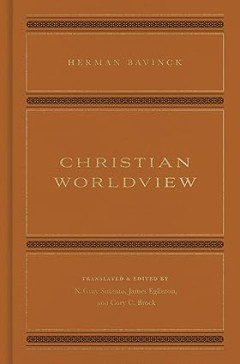
Christian Worldview
Outline : For the First Time in English, a Foundational Work of One of the Church's Most Important Theologians As some point in life, we all wonder: Who am I? What is the world, and what is my place within it? Only Christianity offers answers to these questions in a way that meets our truest needs and satisfies our deepest longings. In this important book, translated into English for the first…
- Edisi
- First Edition
- ISBN/ISSN
- 978-1-4335-6319-5
- Deskripsi Fisik
- 140 hal
- Judul Seri
- -
- No. Panggil
- 230.01 B3295c

Christianity and Western Thought : A History of Philosophers, Ideas and Movem…
Outline: Along with a loss of faith in reason and science, the twentieth century witnessed a loss of faith in the human self and society as a whole. Two devastating world wars left scant reason for Enlightenment optimism. Commencing with Frege, Husserl and Bergson, Alan Padgett and Steve Wilkens chart the course of twentieth-century philosophy on its journey toward postmodernism. The voyage is …
- Edisi
- -
- ISBN/ISSN
- 978-0-8308-3953-7
- Deskripsi Fisik
- 388 hal
- Judul Seri
- -
- No. Panggil
- 261.51 W63c v.3
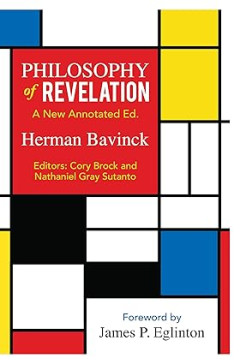
Philosophy of Revelation, The : A New Annotated Edition
Outline : Originally presented by Herman Bavinck (1854-1921) as the Stone Lectures at Princeton Theological Seminary. Philosophy of Revelation is the supreme entry into the mind of this Dutch Reformed theologian at the brink of the twentieth century. This groundbreaking framework of Bavinck's "organic motif" offers renders both a philosophy of revelation and a philosophy of revelation. In the i…
- Edisi
- Second Edition
- ISBN/ISSN
- 978-1-68307-136-5
- Deskripsi Fisik
- 251 hal
- Judul Seri
- -
- No. Panggil
- 231.7\'4 B3295p

Living at the Crossroads: An Introduction to Christian Worldview
Outline: This accessible introduction to Christian worldview explores how Christians can live faithfully at the crossroads of Scripture and postmodern culture. Living at the Crossroads first lays out a brief summary of the biblical story and the most fundamental beliefs of Scripture. The book then tells the story of Western culture from the classical period to postmodernity. Authors Michael Goh…
- Edisi
- -
- ISBN/ISSN
- 978-0-8010-3140-3
- Deskripsi Fisik
- 205 hal
- Judul Seri
- -
- No. Panggil
- 230 G11l
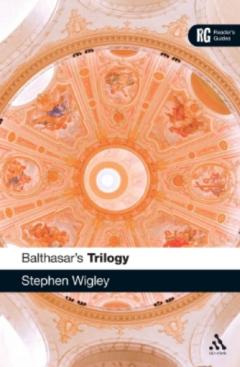
Balthasar's Trilogy
Hans Urs von Balthasar (1905 1988) is one of the most significant and challenging of 20 th century theologians. His work remains highly influential within the Catholic Church; yet much of it is influenced by his encounter with and study of the great Protestant theologian Karl Barth. His writings, particularly the trilogy beginning with The Glory of the Lord, then the Theo- Drama and concluding …
- Edisi
- -
- ISBN/ISSN
- 978-0-567-03416-8
- Deskripsi Fisik
- 171 p.
- Judul Seri
- -
- No. Panggil
- online
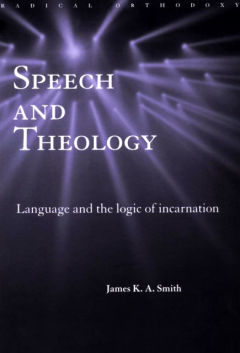
Speech and Theology: Language and the Logic of Incarnation
God is Infinite, but language finite; thus speech would seem to condemn him to finitude. In speaking of God, would the theologian violate divine transcendence by reducing God to immanence, or choose, rather, to remain silent? At stake in this argument is a core problem of the conditions of divine revelation. How, in terms of language and the limitations of human understanding, can transcendence…
- Edisi
- -
- ISBN/ISSN
- 0-203-99527-9
- Deskripsi Fisik
- 186 p.
- Judul Seri
- -
- No. Panggil
- online
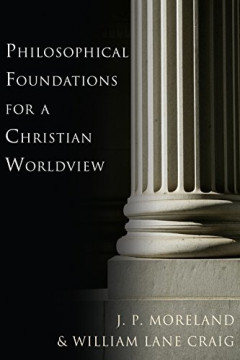
Philosophical Foundations for a Christian Worldview
These are fundamental questions that any thinking person wants answers to. These are questions that philosophy addresses. And the answers we give to these kinds of questions serve as the foundation stones for constructing any kind of worldview. Now updated and expanded in this second edition, Philosophical Foundations for a Christian Worldview by J. P. Moreland and William Lane Craig offers a c…
- Edisi
- First
- ISBN/ISSN
- 9780830876495
- Deskripsi Fisik
- 673 p.
- Judul Seri
- -
- No. Panggil
- -
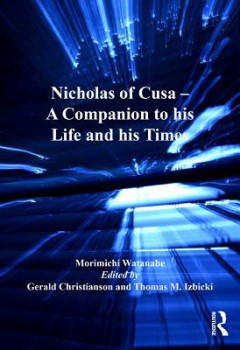
Nicholas of Cusa : a companion to his life and his times
This work is a guide to the life, thought and activities of Nicholas of Cusa (1401-1464), the great fifteenth-century philosopher, theologian, jurist, author of mystical and ecclesiastical treatises, cardinal and reformer. It is intended not only for advanced scholars, but also for beginners and those simply curious about a man who has been called 'one of the greatest Germans of the fifteenth c…
- Edisi
- First
- ISBN/ISSN
- 9781409420392
- Deskripsi Fisik
- 381 p. : illus
- Judul Seri
- -
- No. Panggil
- -

Kingdom Triangle : recover the Christian mind, renovate the soul, restore the…
Western society is in crisis, the result of our culture's embrace of naturalism and postmodernism. At the same time, the biblical worldview has been pushed to the margins. Christians have been strongly influenced by these trends, with the result that the personal lives of Christians often reflect the surrounding culture more than the way of Christ, and the church's transforming influence on soc…
- Edisi
- First
- ISBN/ISSN
- 9780310274322
- Deskripsi Fisik
- 237 p. ; 24 cm
- Judul Seri
- -
- No. Panggil
- -
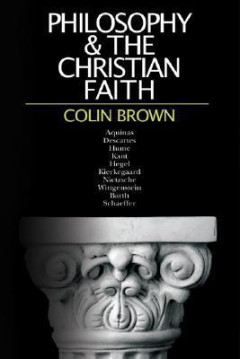
Philosophy & the Christian Faith
Colin Brown surveys the thought of over four hundred philosophers from the Middle Ages to the present day. This clear and concise guide shows how various thinkers and ideas have affected Christian belief and brings together the lessons Christians can learn from philosophy.
- Edisi
- First
- ISBN/ISSN
- 0877847126
- Deskripsi Fisik
- 320 p. ; 21 cm
- Judul Seri
- -
- No. Panggil
- -
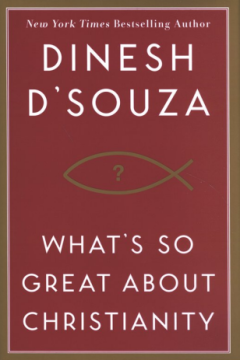
What's So Great About Christianity
In a world of facts and figures, can an intellectual have faith? Is it possible to believe anything the Bible says? Yes, and one man will show you how. Amidst scientists' attempts to debunk Christianity's truths and atheists' assuming the Bible is a how-to-be-virtuous self-help book, bestselling author Dinesh D'Souza resolves to both answer the tough questions and challenge believers as well as…
- Edisi
- First Edition
- ISBN/ISSN
- 978-1-59698-517-9
- Deskripsi Fisik
- 283 p.
- Judul Seri
- -
- No. Panggil
- online
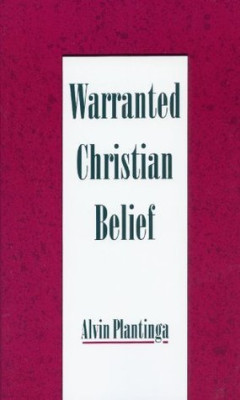
Warranted Christian Belief
This is the third volume in Alvin Plantinga's trilogy on the notion of warrant, which he defines as that which distinguishes knowledge from true belief. In this volume, Plantinga examines warrant's role in theistic belief, tackling the questions of whether it is rational, reasonable, justifiable, and warranted to accept Christian belief and whether there is something epistemically unacceptable …
- Edisi
- First
- ISBN/ISSN
- 9780199881031
- Deskripsi Fisik
- 528 p.
- Judul Seri
- Warrant
- No. Panggil
- online

Faith and Rationality: Reason and Belief in God
This book is a series of essays on the topic of faith and reason. But there are many such essays, and many such books. What, if anything, makes this one significantly different? From near the beginning of Christianity there have been reflections on this topic. It could hardly have been otherwise, given that the culture with which Christianity first interacted, once it had emerged from Judaism, …
- Edisi
- First Edition
- ISBN/ISSN
- 0-268-00964-3
- Deskripsi Fisik
- 321 p. ; 24 cm
- Judul Seri
- -
- No. Panggil
- online

Theology in three dimensions : Guide to triperspectivalism and its signifiance
Outline: John Frame gives us an accessible introduction to "triperspectival" study - where theological issues are fruitfully viewed from multiple perspectives without compromise to their unity and truth.
- Edisi
- -
- ISBN/ISSN
- 978-1-62995-322-9
- Deskripsi Fisik
- 107
- Judul Seri
- -
- No. Panggil
- 230.01 F84t

101 Key Terms in Philosophy and Their Importance for Theology
Outline: Written by two philosophers and a theologian, 101 Key Terms provides easy access to key terms in philosophy and how they are understood and used in theology. The focused entries discuss what the terms have meant in classical and contemporary philosophy and then shift to what these philosophical understandings have meant in the history of Christian theology to the present day. The resul…
- Edisi
- First Edition
- ISBN/ISSN
- -
- Deskripsi Fisik
- 116
- Judul Seri
- -
- No. Panggil
- 103 C51o

Bringing into captivity every thought : Capita Selecta in the history of Chri…
Outline: Throughout history Christian thinkers have attempted to come to terms with the validity of views of scholars committed to non-Christian views of reality. This book gives twelve case studies of how important Christian thinkers in ancient, medieval and modern times have led the way in relating to non-Christian wisdom. The reader is given a sympathetic insight into the personal struggl…
- Edisi
- -
- ISBN/ISSN
- 0-8191-7826
- Deskripsi Fisik
- 271
- Judul Seri
- -
- No. Panggil
- 261.5\'1 K66b

Crossing the Threshld of Divine Revelation
- Edisi
- -
- ISBN/ISSN
- 0-8208-2958-9
- Deskripsi Fisik
- 198
- Judul Seri
- -
- No. Panggil
- 230.01 Ab821c
- Edisi
- -
- ISBN/ISSN
- 0-8208-2958-9
- Deskripsi Fisik
- 198
- Judul Seri
- -
- No. Panggil
- 230.01 Ab821c

Christian Philosophy within Biblical Bounds
Overview: In this book, Christian philosophy is described in ters of its relation to such themes and notions as metaphysics, worldview, the limits of knowledge, common grace, Biblical revelation, hermeneutics, and criticism. In the process, the philosopher's relation to society - both the secular world and the Christian community - is discussed. A special effort is made to outline and distingui…
- Edisi
- First Edition
- ISBN/ISSN
- 0-921100-29-9
- Deskripsi Fisik
- 114
- Judul Seri
- -
- No. Panggil
- 201 P69c

Philosophical Foundations for a Christian Worldview
Overview: In this book, the author offer a comprehensive introduction to philosophy from a Christian perspective. In their broad sweep they seek to introduce readers to the principal subdisciplines of philosophy, including epistemology, metaphysics, philosophy of science, ethics and philosophy of religion. They do so with characteristic clarity and incisivenss. Arguments are clearly presented, …
- Edisi
- -
- ISBN/ISSN
- 0-8308-2694-7
- Deskripsi Fisik
- 653
- Judul Seri
- -
- No. Panggil
- 261.5'1 M71p

Christian Answers to Hard Questions : Christianity and the Role of Philosophy
- Edisi
- -
- ISBN/ISSN
- 9781596388529
- Deskripsi Fisik
- 36
- Judul Seri
- Christian Answers to Hard Questions
- No. Panggil
- 100 Ol13c
- Edisi
- -
- ISBN/ISSN
- 9781596388529
- Deskripsi Fisik
- 36
- Judul Seri
- Christian Answers to Hard Questions
- No. Panggil
- 100 Ol13c

Theology Remixed : Christianity as Story, Game, Language, Culture
- Edisi
- -
- ISBN/ISSN
- 9780830838745
- Deskripsi Fisik
- 206
- Judul Seri
- -
- No. Panggil
- 230.01 EN3t
- Edisi
- -
- ISBN/ISSN
- 9780830838745
- Deskripsi Fisik
- 206
- Judul Seri
- -
- No. Panggil
- 230.01 EN3t

Inerrancy and Worldview : Answering Modern Challenges to the Bible
- Edisi
- -
- ISBN/ISSN
- 9781433523878
- Deskripsi Fisik
- 271
- Judul Seri
- -
- No. Panggil
- 220.132 P75i
- Edisi
- -
- ISBN/ISSN
- 9781433523878
- Deskripsi Fisik
- 271
- Judul Seri
- -
- No. Panggil
- 220.132 P75i

Calvin and Culture : Exploring a Worldview
- Edisi
- -
- ISBN/ISSN
- 9781596380981
- Deskripsi Fisik
- 326
- Judul Seri
- -
- No. Panggil
- 261 H14c
- Edisi
- -
- ISBN/ISSN
- 9781596380981
- Deskripsi Fisik
- 326
- Judul Seri
- -
- No. Panggil
- 261 H14c
 Karya Umum
Karya Umum  Filsafat
Filsafat  Agama
Agama  Ilmu-ilmu Sosial
Ilmu-ilmu Sosial  Bahasa
Bahasa  Ilmu-ilmu Murni
Ilmu-ilmu Murni  Ilmu-ilmu Terapan
Ilmu-ilmu Terapan  Kesenian, Hiburan, dan Olahraga
Kesenian, Hiburan, dan Olahraga  Kesusastraan
Kesusastraan  Geografi dan Sejarah
Geografi dan Sejarah